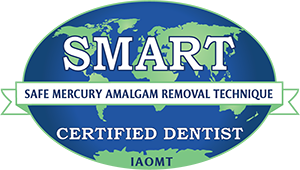Tooth Demineralization and Remineralization: What You Should Know
September 6, 2023

If you are an oral health enthusiast, you might have done some reading about tooth demineralization and remineralization. Still, you might wonder what those things are and how learning about them can affect how you care for your smile. This blog post provides practical and balanced information from an experienced holistic dentist.
What Are Tooth Demineralization and Remineralization?
Teeth are composed of a variety of minerals, such as calcium, phosphorus, and hydroxide. As you eat, drink, and carry out other daily activities, tiny bits of the minerals in your tooth enamel get worn away. This natural process is known as demineralization. When demineralization is severe enough, it leads to cavities and painful spots of decay.
A natural process known as remineralization can prevent dental decay. It replaces lost minerals in the dental enamel, helping it to remain strong so it can protect the sensitive inner layers of your teeth.
How to Minimize Demineralization and Maximize Remineralization
There is no way to completely prevent demineralization of your teeth. However, you can minimize it and promote remineralization by taking a few simple steps:
- Be careful about what you eat and drink. You should try to minimize your intake of sugary treats, such as candy, sodas, and desserts. A gluten-free, Dairy-free, and sugar-free diet will most likely help.
- Eat lots of nutritious foods. Calcium, vitamin D, phosphorous, and other minerals can supply your body with what it needs to keep your teeth strong.
- Using an electric toothbrush: Applying too much pressure, or using a hard-bristled toothbrush, can cause a lot of wear and tear on your enamel. Electric tooth brushes have pressure built in them.
- Using a re-mineralizing tooth paste: There are many tooth pastes available in the market that claim to do this. Read the ingredients and get one that works for your family.
- Stay hydrated. Proper hydration promotes salvia production. Saliva contains minerals that can fortify your teeth.
Can Remineralization Reverse Cavities?
You might have seen some information online claiming that you can reverse dental cavities by remineralizing your teeth. Is that true? Well… sort of.
In its earliest stages, dental decay can be reversed. Excellent oral hygiene, a nutritious diet, and ozone therapy from your dentist may all play a role in strengthening weak spots in your enamel so they do not develop into serious and painful problems.
Weston Price has done much research on this, and his research is worth looking into.
Once the decay reaches a certain point, though, it cannot be reversed. You may need a filling or other restorative treatment from your dentist in order to address the problem and prevent the cavity from worsening.
What about Fluoride?
Conventional dentists often tout fluoride as a miracle remineralizing agent for teeth. However, caution is in order. Fluoride carries some health risks, and you can enjoy a healthy and strong smile without using it. Dr. Thomas can guide you if you are interested in fluoride-free oral healthcare.
Demineralization and remineralization can have a great impact on your teeth’s well-being. Use the information in this article to protect your smile and guard against dental decay.
More about Dr. Thomas
Dr. Preetha Thomas is an experienced holistic dentist who is deeply interested in providing dental care that is beneficial for patients’ mouths and bodies. If you would like her advice on how you can maintain strong and cavity-free teeth, contact Enclave Dental at 817-912-1218.
No Comments
No comments yet.
RSS feed for comments on this post.
Sorry, the comment form is closed at this time.




